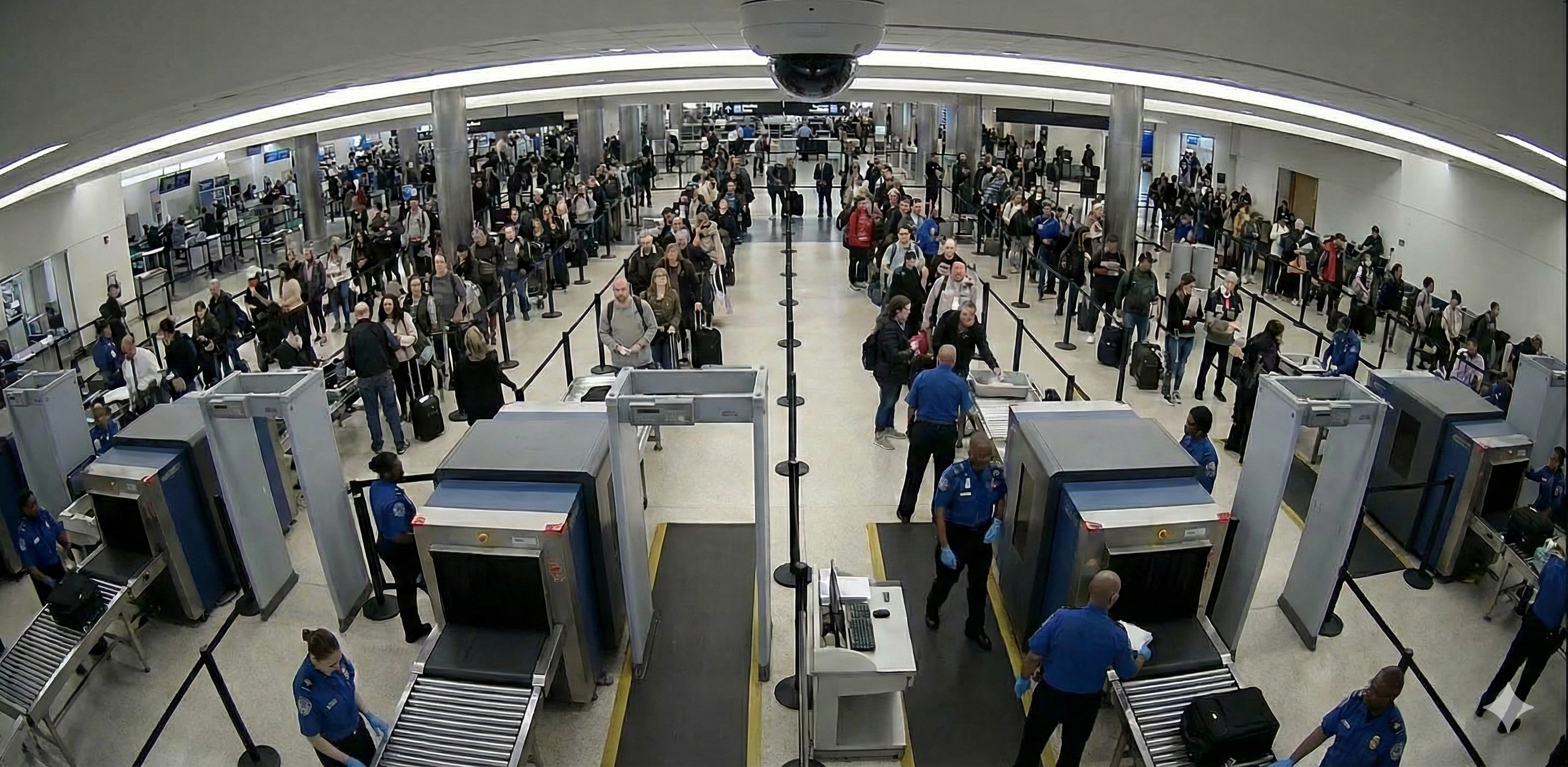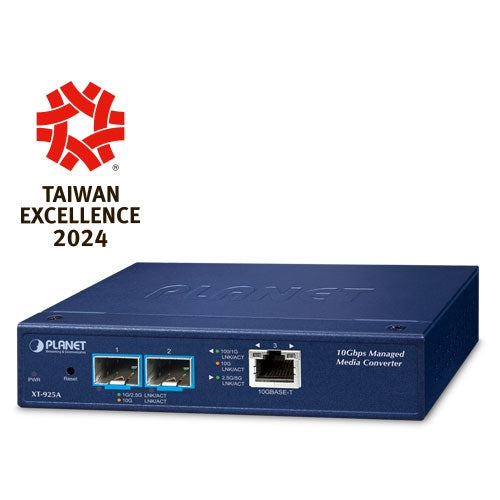
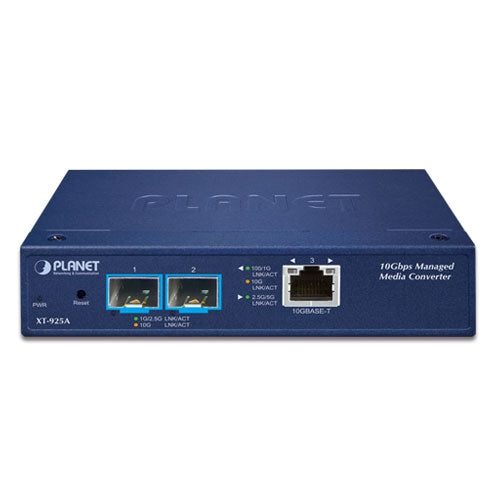
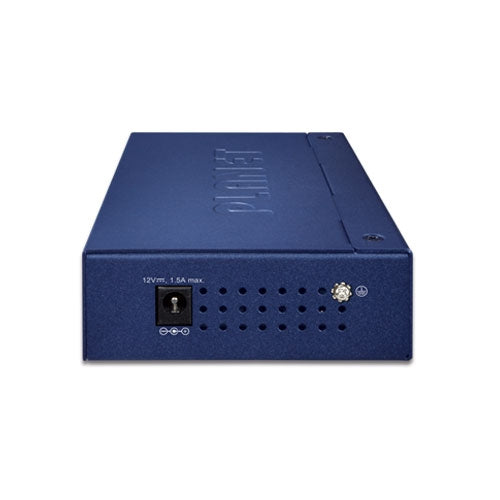
Planet
Planet XT-925A 1-Port 10G/5G/2.5G/1G/100BASE-T + 2-Port 10G/1GBASE-X SFP+ M
Usually Ships in 10 - 12 days
Choose options
Usually Ships in 10 - 12 days
Usually Ships in 10 - 12 days
Ultra-fast Connections and Secure Management
PLANET XT-925A high-performance media converter improves network connectivity and provides sophisticated management capabilities. It is the first 10G media converter in the industry with standalone secure management, making it the best option for enterprise and telecom remote management and monitoring. The XT-925A allows for remote management via an intuitive web interface, command line interface (CLI) and SNMP protocol, enabling easy monitoring and configuration of the converter from anywhere.
Our cutting-edge converter features one 10GBASE-T copper port and two 10G SFP+ ports, integrating the power of 10G connectivity with the versatility of fiber and copper ports. This powerful yet compact solution makes it the ideal choice for businesses looking to boost their network speed and functionality.
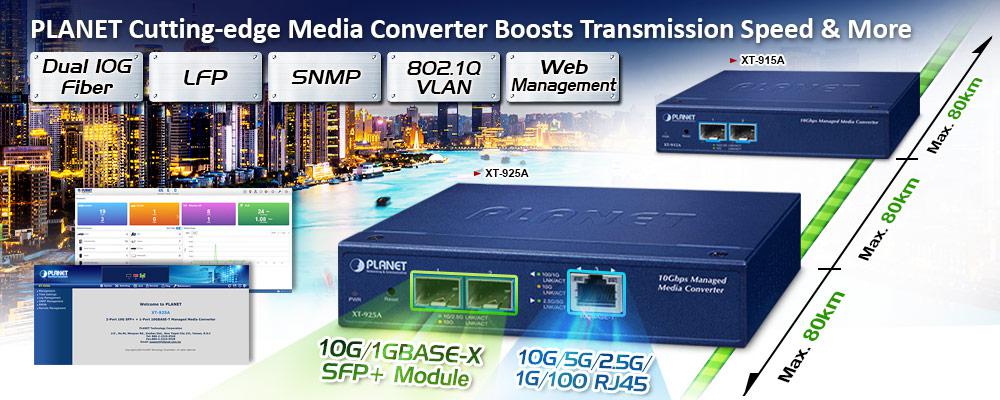
10GBASE-T and 10GBASE-X SFP Dual Media Interfaces for Diversified Bandwidth Applications
The XT-925A can reach speeds of up to 10Gbps over copper or fiber-optic cabling, greatly improving the performance of large data transmissions. Its built-in 10GBASE-T copper interfaces feature 5-speed auto-negotiation (10G/5G/2.5G/1G/100) and can transmit data at 10Gbps over the existing Cat6A/Cat7 UTP cabling, eliminating the need for expensive upgrades. With its Plug and Play design, installation is easy and hassle-free, so you can enjoy the speed you need without any extra effort.
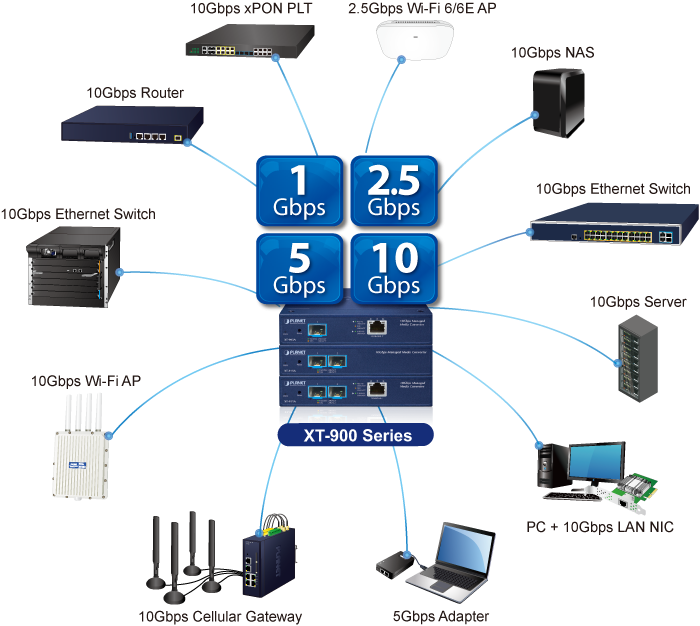
The fiber-optic 10GBASE-X SFP+ interfaces support 4 speeds, 10GBASE-SR/LR, 2500BASE-X, 1000BASE-SX/LX and 100BASE-FX, meaning the administrator now can flexibly choose the suitable SFP/SFP+ transceiver according to the transmission distance or the transmission speed required to extend the network efficiently.
Two Fiber Optic Ports Double the Distance of Deployment
Conventional media converters typically support only a single pair of different media conversions, such as converting one fiber to one copper connection. They can extend a 100m copper connection to a maximum of 120km fiber optic connection. In contrast, the XT-925A has two fiber optic ports and one copper port, enabling the two fiber optic cables to connect to devices up to 240km apart so as to significantly extend the deployment distance.
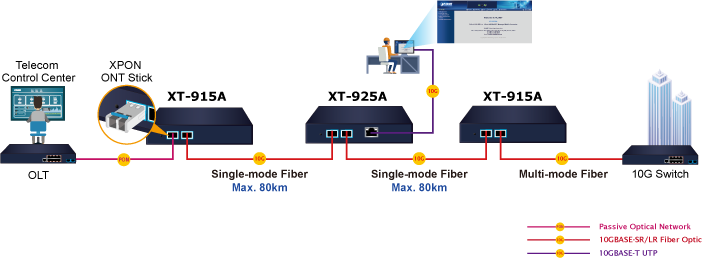
Link Fault Pass-through
Link Fault Pass-through is a networking feature. It facilitates the detection and propagation of link faults or errors from one network device to another. It helps maintain network reliability and minimizes downtime by allowing devices to dynamically respond to link faults. Link Fault Pass-through improves fault detection and enables faster troubleshooting and resolution processes.
How it works:
- When a link fault occurs, the device experiencing the fault generates a notification.
- This notification is then forwarded to other connected devices using Link Fault Pass-through.
- Upon receiving the link fault information, the connected devices become aware of the fault.
- This awareness enables them to take appropriate actions, such as rerouting traffic or disabling the affected port.
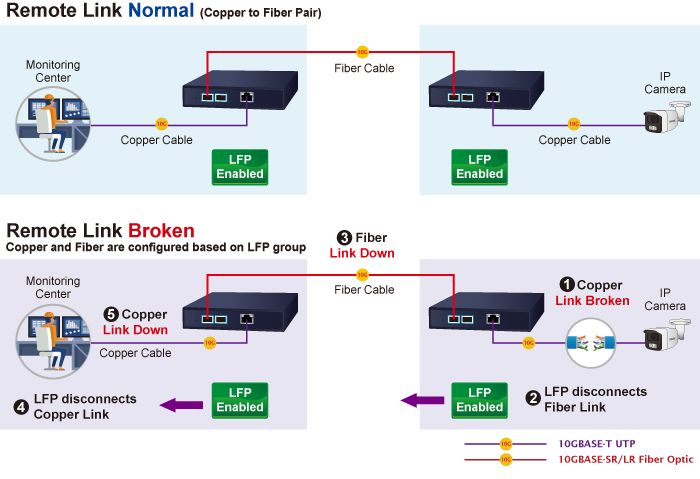
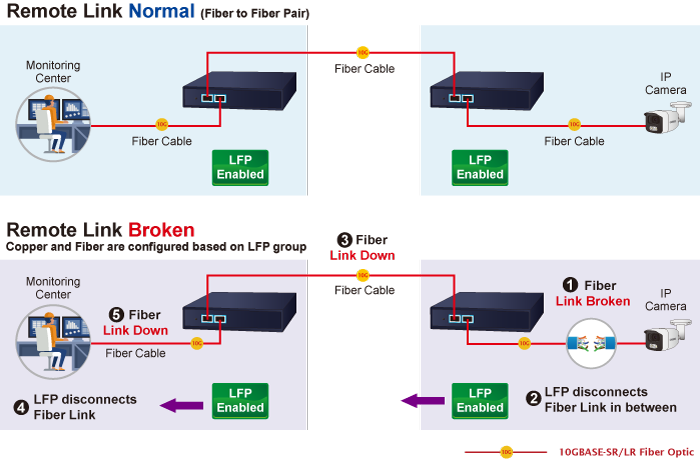
Network with Cybersecurity Helps Minimize Risks
The XT-925A is equipped with enhanced cybersecurity features to fend off cyber threats and attacks. It supports SSHv2, TLSv1.2, and SNMPv3 protocols to provide strong protection against advanced threats. To safely transmit critical data to colleagues or customers via fiber optic cabling, the XT-925A’s cybersecurity feature protects network management and enhances the security of mission-critical networks without incurring any additional deployment cost or effort.

Redundant Ring, Fast Recovery for Critical Network Applications
The XT-925A supports software-based redundant ring technology and features strong, rapid self-recovery capability to prevent interruption and external intrusions. It incorporates advanced ITU-T G.8032 ERPS (Ethernet Ring Protection Switching) technology, ensuring rapid self-recovery in ring networks. With this advanced feature, the data link recovery time can be as fast as 500ms.
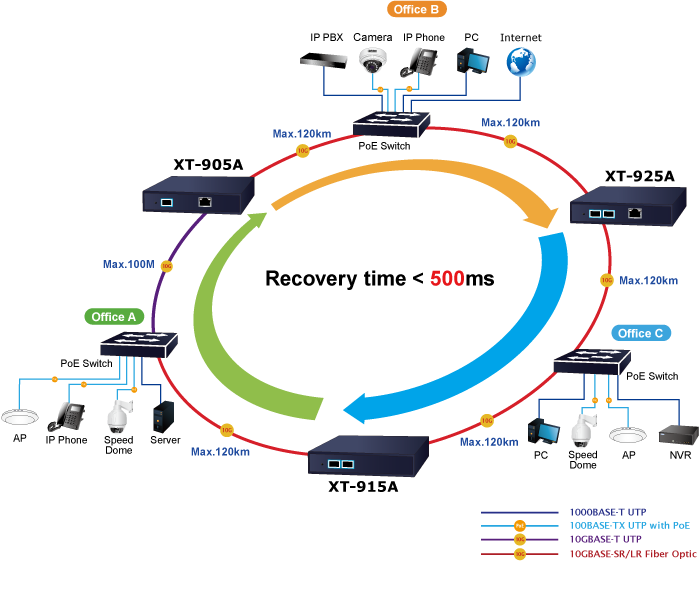
IPv6/IPv4 Dual Stack Management
Supporting both IPv6 and IPv4 protocols, the XT-925A helps the enterprises and telecoms to step in the IPv6 era with the lowest investment as their network facilities need not be replaced or overhauled if the IPv6 FTTx edge network is set up.
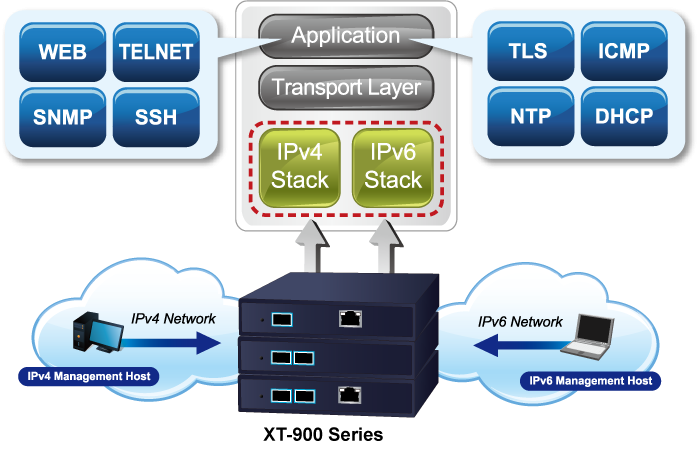
SNMP for Comprehensive Network Monitoring and Centralized Control
SNMP (Simple Network Management Protocol) provides network monitoring and management capabilities by gathering real-time information about network devices. By proactively identifying and addressing network issues, reliability and performance are improved. SNMP also facilitates centralized control of network devices, allowing for monitoring and configuration of multiple devices from a single location, reducing manual effort and enhancing operational efficiency.
Layer 2 Features
The device has a 16K-entry MAC address table that automatically removes inactive addresses. Its backbone supports speeds of up to 60Gbps, and it can handle Jumbo Frames up to 1.2K in size. The device is equipped with Storm Control to manage Broadcast/Multicast/Unknown Unicast traffic to prevent excessive network flooding.
Efficient Traffic Control
The XT-925A media converter boasts advanced QoS features and robust traffic management capabilities, optimizing the delivery of business-class data, voice, and video solutions. Its feature set includes broadcast/multicast/unicast storm control, per-port bandwidth control, and 802.1p CoS/DSCP/IP Precedence QoS priority and remarking. These capabilities guarantee optimal performance for VoIP and video stream transmission, maximizing the utilization of limited network resources for enterprises
Intelligent SFP Diagnosis Mechanism
The XT-925A supports the SFP-DDM (digital diagnostic monitor) function, which greatly helps network administrators easily monitor real-time parameters of the SFP transceivers. These parameters include optical output power, optical input power, temperature, laser bias current, and transceiver supply voltage.
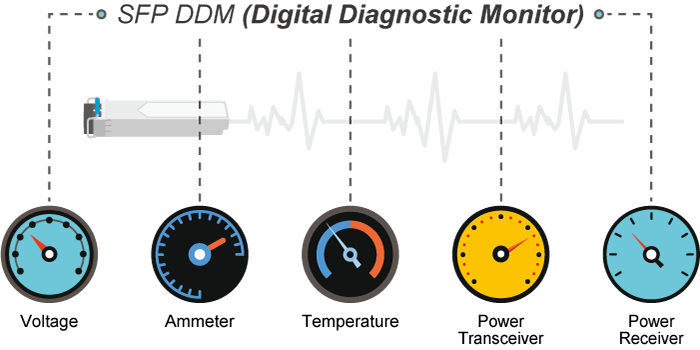
Remote Management Solution
PLANET's Universal Network Management System (UNI-NMS) and CloudViewer app support IT staff in remotely managing all network devices and monitoring the operation statuses of the XT-925A. These systems are designed for both enterprises and industries where the deployments of the XT-925A can be remote. This allows for bugs or faulty conditions to be found without having to go to the actual location. With UNI-NMS or CloudViewer app, all kinds of businesses can now be speedily and efficiently managed from one platform.
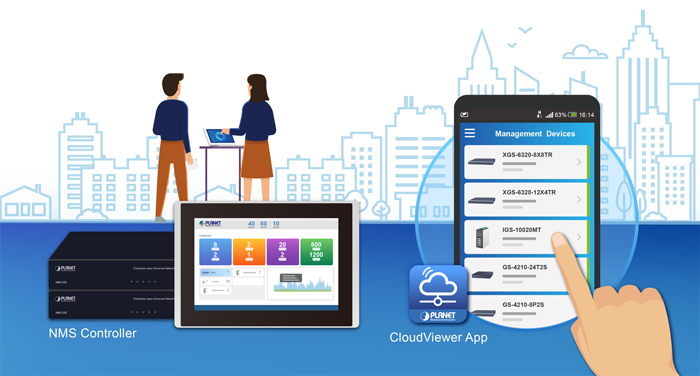
Physical Port
- One 10G/5G/2.5G/1G/100BASE-T RJ45 interface with auto MDI/MDI-X function
- Two 10G/2.5G/1G/100BASE-X SFP+ interface
Layer 2 Features
- Storm Control support
- Broadcast / Multicast / Unknown Unicast
- Supports VLAN
- IEEE 802.1Q tagged VLAN
- Supports provider bridging (VLAN Q-in-Q, IEEE 802.1ad)
- Up to 256 VLAN groups, out of 4096 VLAN IDs
- Supports ITU-T G.8032 ERPS ring with recovery time less than 500ms (software-based)
- Link Layer Discovery Protocol (LLDP)
- 16K MAC address table with auto-aging
- Jumbo Frame support up to 12K in size
Quality of Service
- Ingress Shaper and Egress Rate Limit per port bandwidth control
- 8 priority queues on all converter ports
- Strict priority and Weighted Round Robin (WRR) CoS policies
- Traffic classification
- IEEE 802.1p CoS
- IP TOS / DSCP / IP Precedence
- IP TCP/UDP port number
- Typical network application
Management
- IPv4 and IPv6 dual stack management
- Support Link Fault Pass-through
- Management Interfaces
- Web HTTP/HTTPS management
- Telnet Command Line Interface
- SNMPv1, v2c, v3 monitoring
- SSHv2, TLSv1.2
- System Maintenance
- Firmware upload/download via HTTP
- Reset button for system reboot or reset to factory default
- Dual images
- Simple Network Time Protocol (SNTP)
- User privilege levels control
- SNMP Management
- SNMP trap for interface link up and link down notification
- Four RMON groups (history, statistics, alarms and events)
- Network Diagnostic
- SFP-DDM (Digital Diagnostic Monitor)
- Syslog remote alarm
- Local system Log
- ICMPv6 / ICMPv4 remote ping
- PLANET Smart Discovery Utility for convenient deployment
- PLANET Remote Management
- PLANET NMS Controller and CloudViewer app for central management
Security
- IP address access management to prevent unauthorized intruder
- Static MAC setting and MAC Filtering
- Protected ports
Case and Installation
- External 12VDC, 1.5A power adapter
- 0 to 50 degrees C operating temperature
- Supports 4KVDC Contact/8KVDC Air Ethernet ESD protection
- Wall-mount and DIN-rail installation (optional)
| Hardware Specifications | |
|---|---|
| Copper Interface | 1x 10G/5G/2.5G/1G/100BASE-T RJ45 interface with auto MDI/MDI-X function |
| Fiber Interface | 2x 10G/2.5G/1G/100BASE-X SFP+ interface |
| Reset Button | < 5 sec.: System reboot > 5 sec.: Factory default |
| ESD Protection | 4KVDC Contact / 8KVDC Air |
| Enclosure | Compact-sized metal case |
| Installation | Wall-mount and DIN-rail kit installation (optional) |
| Dimensions (W x D x H) | 135 x 87.8 x 20mm |
| Weight | 437g (device only) |
| Power Requirement | DC 12V, 1.5A, external power adapter |
| Power Consumption (XT-925A) | 3.24 watt/11.06 BTU/hr (No Loading) / 12.5 watt/42.65 BTU/hr (Full Loading) |
| LED Indicator |
System: PWR, (Green) Per 10GBASE-T RJ45 Port: 1G/100 LINK/ACT (Green) 2.5G/5G LINK/ACT (Green) 10G LINK/ACT (Amber) Per 10GBASE-X SFP+ Port: 1G LINK/ACT (Green) 2.5G LINK/ACT (Green) 10G LINK/ACT (Amber) |
| Transmission Specifications | |
| Processing Scheme | Store and Forward |
| Fabric | 60Gbps |
| Throughput (packet per second) | 29.76Mpps@64bytes |
| Address Table | 16K entries, automatic source address learning and aging |
| Flow Control | Back pressure for half duplex IEEE 802.3x pause frame for full duplex |
| Jumbo Frame | 12K |
| Shared Buffer | 12Mbits |
| Layer 2 Function | |
| Port Configuration | Port disable/enable Auto-negotiation 100Mbps, 1/2.5/5/10Gbps full and half duplex mode selection Flow control disable/enable |
| Port Status | Display each port’s link status, speed, Auto-negotiation status, duplex mode, flow control status |
| VLAN | IEEE 802.1Q tag-based VLAN IEEE 802.1ad Q-in-Q tunneling Up to 256 VLAN groups, out of 4096 VLAN IDs |
| Bandwidth Control | Per port bandwidth control Ingress: 16~10,000,000Kbps Egress: 16~10,000,000Kbps |
| QoS | Traffic classification based, strict priority and WRR 8-level priority for switching Traffic classification: Cos/802.1p DSCP IP Precedence |
| Ring | Supports ERPS, and complies with ITU-T G.8032 Recovery time < 450ms |
| Security Function | |
| Access Security | Remote management protocols support: SSH, Telnet, HTTP and HTTPs Protected ports |
| System Management | |
| Basic Management Interfaces | Telnet, Web browser, SNMP v1, v2c |
| Secure Management Interfaces | SSHv2, TLSv1.2, SNMPv3 |
| System Management | Firmware upgrade by HTTP protocol through Ethernet network Configuration upload/download through HTTP LLDP protocol SNTP PLANET Smart Discovery Utility PLANET NMS Controller PLANET CloudViewer mobile app |
| Event Management | Remote syslog Local system log SNMP trap |
| SNMP MIBs | RFC 1213 MIB-II RFC 2863 IF-MIB RFC 1493 Bridge MIB RFC 1643 Ethernet MIB RFC 2863 Interface MIB RFC 2665 Ether-Like MIB RFC 2737 Entity MIB RFC 2819 RMON MIB (Groups 1, 2, 3 and 9) RFC 3411 SNMP-Frameworks-MIB LLDP MAU-MIB |
| Standards Conformance | |
| Regulatory Compliance | FCC Part 15 Class A, CE Class A |
| Stability Testing | IEC60068-2-32 (free fall) IEC60068-2-27 (shock) IEC60068-2-6 (vibration) |
| Standards Compliance | IEEE 802.3u, 100BASE-TX/FX IEEE 802.3ab, 1000BASE-T IEEE 802.3bz, 2.5G/5GBASE-T IEEE 802.3an, 10GBASE-T IEEE 802.3z, 1000BASE-SX/LX IEEE 802.3ae 10GBASE-SR/LR IEEE 802.3x full-duplex flow control IEEE 802.1p Class of Service IEEE 802.1Q VLAN tagging IEEE 802.1ad Q-in-Q VLAN stacking IEEE 802.1ab LLDP RFC 768 UDP RFC 2474 DSCP RFC 791 IP RFC 792 ICMP RFC 2068 HTTP ITU-T G.8032 ERPS Ring |
| Environment | |
| Operating | Temperature: 0 ~ 50 degrees C Relative Humidity: 5 ~ 95% (non-condensing) |
| Storage | Temperature: -10 ~ 70 degrees C Relative Humidity: 5 ~ 95% (non-condensing) |




